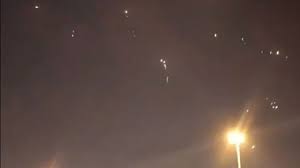Iran says missile strikes on US air base in Qatar were self-defence, not aimed at Doha

In a dramatic escalation of tensions, Iran fired a series of missiles at the U.S.-run Al Udeid Air Base in Qatar on Sunday night. The strikes came just two days after American air raids hit Iranian nuclear facilities. Iran described its action as a legitimate act of self-defence and stressed it did not target Qatar.
Iran Says Strike Was Justified
Iranian officials quickly issued a statement after the attack. They claimed the operation was in response to “unlawful U.S. aggression.” Iran referred to Article 51 of the UN Charter, which permits a nation to defend itself.
“This strike was aimed strictly at American military assets. It was not meant as an act of hostility toward the Qatari state or its people,” said Nasser Kanaani, spokesperson for Iran’s foreign ministry. “Qatar remains a friendly and brotherly nation to us.”
The statement tried to calm fears across the Gulf, suggesting Iran took care to avoid harming its regional neighbors.
Al Udeid’s Strategic Role
Located southwest of Doha, Al Udeid Air Base is a major hub for U.S. military operations in the Middle East. Thousands of American troops are stationed there. The base supports missions in Iraq, Syria, and Afghanistan.
Iran reportedly launched between 14 and 19 short- and medium-range ballistic missiles. U.S. and Qatari air defences intercepted most of them. However, a few landed near the base, causing minor structural damage. No injuries were reported.
Although Iran has targeted U.S. bases in the region before, this is the first time it has attacked one inside Qatar.
Qatar Reacts Firmly but Carefully
Qatar swiftly condemned the missile strikes. Officials summoned the Iranian ambassador and demanded an explanation. At the same time, Qatari leaders confirmed Iran had warned them in advance.
“We were informed that the strike was focused on American positions,” said Qatar’s Foreign Minister Sheikh Mohammed bin Abdulrahman Al Thani. “Nonetheless, we consider any missile landing on our territory a breach of our sovereignty.”
Doha now finds itself in a difficult spot. While it hosts American troops, it also maintains diplomatic and economic ties with Tehran. Balancing both sides has grown increasingly complex.
U.S. Downplays the Attack
President Donald Trump, speaking from the White House lawn, said the missile strike caused little damage and showed Iran’s weakness. “They warned us. Our defence systems worked. This was a very weak response,” Trump said.
He also stated that the U.S. would not retaliate immediately. According to Pentagon sources, the U.S. had intelligence of an impending strike and had already activated its missile defence systems.
White House aides confirmed high-level meetings were underway, but emphasized that the focus remained on diplomacy and de-escalation.
Global Response: Caution and Concern
The strike raised alarms across the region. Saudi Arabia and the UAE condemned Iran’s actions and called for international intervention. Israel urged Western nations to respond more forcefully.
Russia and China, which often support Iran diplomatically, urged all parties to exercise restraint. The European Union called for an immediate halt to military actions and encouraged renewed talks.
UN Secretary-General António Guterres expressed deep concern. “The risk of regional war is rising. We urge all nations to act with caution and avoid further escalation,” he said.
Strategic Implications for the Region
Security experts believe this strike sends a strong message. Iran appears to be signaling that U.S. military installations in the region are vulnerable. At the same time, Iran seems careful not to provoke Qatar or push other Gulf nations into direct conflict.
“This was a warning shot,” said Dr. Ali Vaez, a senior analyst at the International Crisis Group. “Iran wants to show it won’t tolerate attacks on its nuclear assets. But it also wants to avoid a full-scale war.”
The incident could make it harder for diplomats to revive the nuclear agreement between Iran and world powers. Talks have already stalled. This fresh military action may only deepen the mistrust on all sides.
Qatar’s Balancing Act
For Qatar, the attack highlights a long-standing challenge. Hosting the U.S. military gives Doha global influence. But close relations with Iran are also part of its regional strategy.
Qatar has often played the role of mediator in Middle East conflicts. But as tensions mount, that balancing act becomes riskier. Any future escalation may force Qatar to pick a side, something it has long tried to avoid.
Conclusion
Iran’s missile attack on the U.S. base in Qatar marks a dangerous new turn in an already fragile regional landscape. Tehran insists it acted in self-defence and tried to avoid involving Qatar directly. Still, the act drew strong reactions and increased fears of a broader conflict.
While Qatar condemned the attack, it also acknowledged Iran’s warning. The U.S. played down the event but remains on alert. As the situation evolves, the world watches closely—hoping that diplomacy can still prevail over war.






